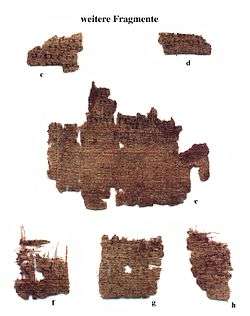Romans 5
| Romans 5 | |
|---|---|
|
Fragment c to h containing parts of the Epistle to the Romans in Papyrus 40, written about AD 250. | |
| Book | Epistle to the Romans |
| Bible part | New Testament |
| Order in the Bible part | 6 |
| Category | Pauline epistles |
Romans 5 is the fifth chapter of the Epistle to the Romans in the New Testament of the Christian Bible. It is authored by Paul the Apostle, but written by an amanuensis, Tertius of Iconium, while Paul was in Corinth, in winter of AD 57-58.[1] Paul wrote to the Roman Christians in order to give them a substantial resume of his theology.[2]
Text
- The original text is written in Koine Greek.
- Some most ancient manuscripts containing this chapter are:
- Codex Vaticanus (AD 325-350)
- Codex Sinaiticus (AD 330-360)
- Codex Alexandrinus (ca. AD 400-440)
- Codex Ephraemi Rescriptus (ca. AD 450; complete)
- Papyrus 31 (7th century; extant: verses 3-8)
- This chapter is divided into 21 verses.
Structure
The New King James Version organises this chapter as follows:
- Romans 5:1-5 = Faith Triumphs in Trouble
- Romans 5:6-11 = Christ in Our Place
- Romans 5:12-21 = Death in Adam, Life in Christ
Cross references
- Romans 5:1 = Habakkuk 2:4: But the just shall live by his faith
Peace with God through our Lord Jesus Christ
Romans 5:1 opens a new section in Paul's letter. Scottish Free Church minister William Robertson Nicoll imagines "that a pause comes ... in [Paul's dictation of] his work; that he is silent, and Tertius puts down the pen, and they spend their hearts awhile on worshipping, recollection and realisation. The Lord delivered up; His people justified; the Lord risen again, alive for evermore - here was matter for love, joy, and wonder".[3]
Paul resumes with "a description of the serene and blissful state which the sense of justification brings":[4]
- We have peace with God through our Lord Jesus Christ
The Textus Receptus reads Greek: εἰρήνην ἔχομεν, (eirēnēn echomen, we have peace) but some manuscripts read Greek: εἰρήνην ἔχωμεν, (eirēnēn echōmen, let us maintain peace with God) and similarly the Vulgate reads pacem habeamus, let us have peace. Theologian Heinrich Meyer argues that this variant "is here utterly unsuitable; because the writer now enters on a new and important doctrinal topic, and an exhortation at the very outset, especially regarding a subject not yet expressly spoken of, would at this stage be out of place".[5] The New Living Translation speaks of "peace with God because of what Jesus Christ our Lord has done for us".[6]
Verse 8
- But God demonstrates His own love toward us, in that while we were still sinners, Christ died for us.[7]
Cross reference: John 3:16; John 15:13; 1 Peter 3:18; 1 John 3:16; 1 John 4:10
Verse 14
- Nevertheless death reigned from Adam to Moses, even over those who had not sinned according to the likeness of the transgression of Adam, who is a type of Him who was to come.[8]
See also
References
- ↑ Halley, Henry H. Halley's Bible Handbook: an Abbreviated Bible Commentary. 23rd edition. Zondervan Publishing House. 1962.
- ↑ Holman Illustrated Bible Handbook. Holman Bible Publishers, Nashville, Tennessee. 2012.
- ↑ Expositor's Bible Commentary on Romans 5, accessed 11 September 2016
- ↑ Ellicott's Commentary for English Readers on Romans 5, accessed 11 September 2016
- ↑ Meyer's NT Commentary on Romans 5, accessed 11 September 2016
- ↑ New Living Translation, Romans 5:1
- ↑ Romans 5:8
- ↑ Romans 5:14
